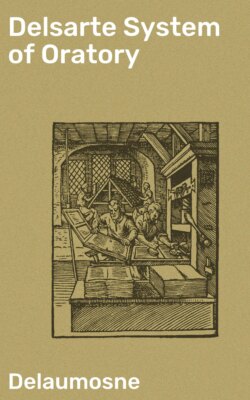Читать книгу Delsarte System of Oratory - Delaumosne - Страница 32
На сайте Литреса книга снята с продажи.
Retroaction.
ОглавлениеWe have formulated this general law: The eccentric, normal and concentric expression must correspond to the sensitive, moral and intellectual state of man. When gesture is concerned, the law is thus modified: In the sensitive state, the gesture, which is naturally eccentric, may become concentric, as the orator is passive or active.
He is passive when subject to any action whatever, when he depicts an emotion.
He is agent when he communicates to the audience the expression of his own will or power; in a word, at all times when he controls his audience.
When the orator assumes the passive rôle, that is, when he reflects, he gazes upon his audience; he makes a backward (or concentric) movement; when he assumes the active rôle, he makes a forward (or eccentric) movement. When one speaks to others, he advances; when one speaks to himself, he recoils a step, his thought centres upon himself.
In the passive state, one loves. But when he loves, he does not move forward. A being who feels, draws back, and contemplates the object toward which the hand extends. Contemplation makes the body retroact.
Hence in the passive state, the orator must step backward. In the opposite state he moves forward. Let us apply this law: A spendthrift officer meets his landlord, whom he has not yet paid, and greets him with an--"Ah, good day, sir!" What will be his movement? It must be retroactive. In the joy of seeing a friend again, as also in fright, we start back from the object loved or hated. Such is the law of nature, and it cannot be ignored.
Whence comes this law? To behold a loved object fully, we must step back, remove to some little distance from it. Look at a painter admiring his work. It is retroaction at sight of a beloved person, which has led to the discovery of the phenomena of life, to this triple state of man which is found in like manner, everywhere: Concentric, eccentric, and normal.
The concentric is the passive state, for when one experiences a deep emotion, he must retroact. Hence a demonstration of affection is not made with a forward movement. If so, there is no love. Expiration is the sign of him who gives his heart. Hence there is joy and love. In inspiration there is retroaction, and, in some sort, distrust. The hand extends toward the beloved object; if the hand tend toward itself, a love of self is indicated. Love is expressed by a retroactive, never by a forward movement. In portraying this sentiment the hand must not be carried to the heart. This is nonsense; it is an oratorical crime. The hand must tend toward the loved being to caress, to grasp, to reassure or to defend. The hand is carried to the heart only in case of suffering there.
Take this passage from Racine's Phèdre:
Dieu--que ne puis-je à l'ombre des fôrets, Suivre de l'oeil un char fuyant dans la carrière--
("God--may I not, through the dim forest shades,
With my glance follow a fleet chariot's course.")
Here the actor does not follow affectionately, but with the eye, and then by recoiling and concentrating his thought upon himself.
In the role of Emilie:
"He may in falling crush thee 'neath his fall"
at sight of her crushed lover Emilie must recoil in terror, and not seem to add the weight of her body to that which crushes the victim.
Augustus, on the contrary, may say:
"I might in falling crush thee 'neath my fall,"
pausing upon a forward movement, because he is here the agent.
Let us note in passing that the passive attitude is the type of energetic natures. They have something in themselves which suffices them. This is a sort of repose; it is elasticity.
